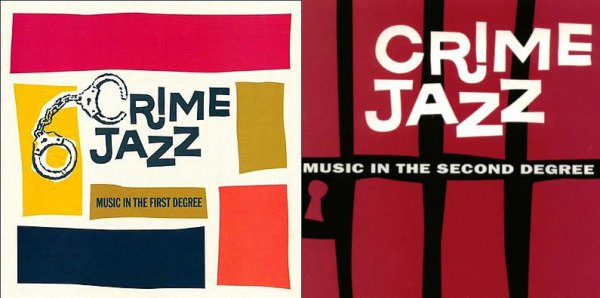When we think of film noir, we tend to think of a mood best set by a look: shadow and light (mostly shadow), grim but visually rich weather, near-depopulated urban streets. You’ll see plenty of that pulled off at the height of the craft in the movies that make up “noirchaeologist” Eddie Muller’s list of 25 noir pictures that will endure, which we featured last week. But what will you hear? Though no one compositional style dominated the soundtracks of films noirs, you’ll certainly hear more than a few solid pieces of crime jazz. Xeni Jardin at Boing Boing, writing about Rhino’s eponymous compilation album, defines this musical genre as “jazzy theme music from 1950s TV shows and movies in which very bad people do very bad things.” She links to PopCult’s collection of classic crime jazz soundtrack album covers, from The Third Man to Charade (the best Hitchcock film, of course, that Hitchcock never made), to The Man With the Golden Arm, all as evocative as the music itself.
“Previously, movie music meant sweeping orchestral themes or traditional Broadway-style musicals,” says PopCult. “But with the growing popularity of bebop and hard bop as the sound of urban cool, studios began latching onto the now beat as a way to make their movies seem gritty or ‘street.'” At Jazz.com, Alan Kurtz writes about the spread of crime jazz from straight-up film noir to all sorts of productions having to do with life outside the law: “In movies and TV, jazz accompanied the entire sordid range of police-blotter behavior, from gambling, prostitution and drug addiction to theft, assault, murder and capital punishment.” Get yourself in the spirit of all those midcentury degeneracies and more with the tracks featured here, all of which will take you straight to an earlier kind of mean street: the theme from The M Squad, “two minutes of mayhem by Count Basie and his mob of heavies”; Miles Davis’ “Au Bar du Petit Bac,” improvised by Davis and his Parisian band against Louis Malle’s Elevator to the Gallows; and Ray Anthony’s “Peter Gunn Theme,” a “quickie cover” that “beat Henry Mancini’s original to the punch.”
And finally we have Duke Ellington’s score for Anatomy of a Murder, directed by Otto Preminger in 1959.
>via: http://www.openculture.com/2014/02/crime-jazz.html

